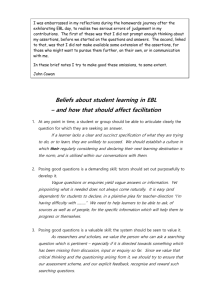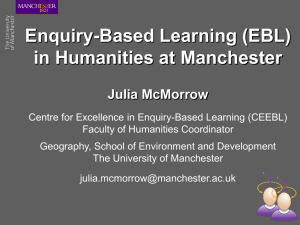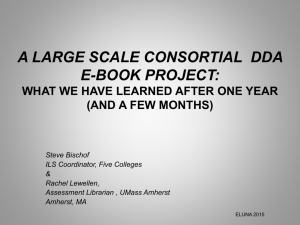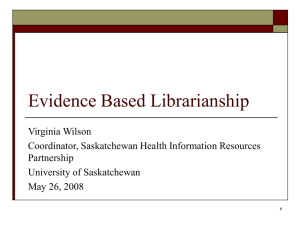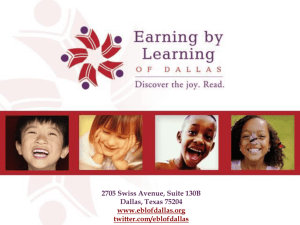Abstracts - Newcastle University
advertisement
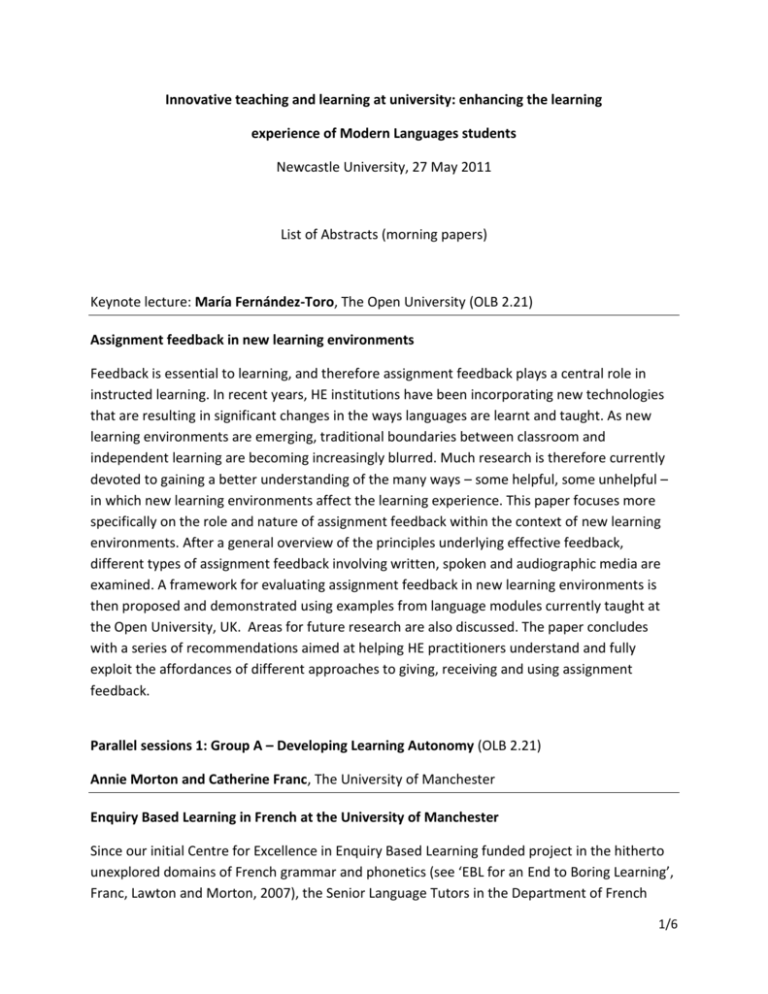
Innovative teaching and learning at university: enhancing the learning experience of Modern Languages students Newcastle University, 27 May 2011 List of Abstracts (morning papers) Keynote lecture: María Fernández-Toro, The Open University (OLB 2.21) Assignment feedback in new learning environments Feedback is essential to learning, and therefore assignment feedback plays a central role in instructed learning. In recent years, HE institutions have been incorporating new technologies that are resulting in significant changes in the ways languages are learnt and taught. As new learning environments are emerging, traditional boundaries between classroom and independent learning are becoming increasingly blurred. Much research is therefore currently devoted to gaining a better understanding of the many ways – some helpful, some unhelpful – in which new learning environments affect the learning experience. This paper focuses more specifically on the role and nature of assignment feedback within the context of new learning environments. After a general overview of the principles underlying effective feedback, different types of assignment feedback involving written, spoken and audiographic media are examined. A framework for evaluating assignment feedback in new learning environments is then proposed and demonstrated using examples from language modules currently taught at the Open University, UK. Areas for future research are also discussed. The paper concludes with a series of recommendations aimed at helping HE practitioners understand and fully exploit the affordances of different approaches to giving, receiving and using assignment feedback. Parallel sessions 1: Group A – Developing Learning Autonomy (OLB 2.21) Annie Morton and Catherine Franc, The University of Manchester Enquiry Based Learning in French at the University of Manchester Since our initial Centre for Excellence in Enquiry Based Learning funded project in the hitherto unexplored domains of French grammar and phonetics (see ‘EBL for an End to Boring Learning’, Franc, Lawton and Morton, 2007), the Senior Language Tutors in the Department of French 1/6 Studies at the University of Manchester have continued to promote and develop EBL in the Manchester French curriculum. This case study will explore several projects: the embedding of EBL in the oral French curriculum; PAGeS (Peer-assisted Grammar Revision (ebl) sessions; its offspring ‘Creating PAGeS,’ in which students actively produce learning resources; and the Year Abroad project currently being discussed. These initiatives span all three undergraduate years, harnessing EBL to develop learner autonomy and sustain motivation in areas of the discipline which are usually considered ‘challenging’ and in the context of a large cohort. We hope that delegates will be able to learn from our experience in order to enhance provision in their own institution, as well as having some concrete examples of EBL language scenarios that could be adapted for use in any HE setting. Janet Poveda, Juan Muñoz-López, Mara Fuertes-Gutiérrez and Wolfgang Keinhorst, Languages, Carnegie Faculty, Leeds Metropolitan University The Period Abroad E-portfolio The ‘Period Abroad E-portfolio’ presented and demonstrated in this paper encourages students on their period abroad to engage more fully with the culture(s) and language and to reflect on the resulting cultural and linguistic development. It promotes independent learning, proposes a meaningful assessment for the Year Abroad learning objectives and formalises our support to students through our VLE whilst they are abroad. Students reflect on their progress towards cultural adaptation through the intercultural experiences and challenges they encounter whilst completing the task in hand. It is equally important for them to reflect on the linguistic skills used during the activity and to self-assess their communicative ability against the relevant descriptors of the European Common Language Framework at regular intervals. The e-portfolio empowers students who record, evidence and edit their task fulfillment and cultural/linguistic reflection in the target language using a variety of multimedia formats, while the online nature of the project enables regular feedback and mentoring by home tutors. 2/6 Parallel sessions 1: Group B – Enhancing student learning via collaborative tools (OLB 2.22) Adela Bond & Mara Fuertes-Gutiérrez, Leeds Metropolitan University Enhancing students’ academic writing skills through a wiki Many students today seem as comfortable interacting with each other online as meeting up offline. By tapping into students’ familiarity with digital technologies, language tutors can increase their students’ opportunities to practise their writing skills outside the classroom and to enhance their independent learning strategies. To this end, we have developed a wiki (a collection of web pages that can be created and edited by any user) using a virtual learning environment that integrates tools which allow students to share or compare their essays easily and to write collaboratively in an environment that university students find particularly motivating and inspiring. It is divided into different sections according to the main linguistic and stylistic features of academic writing with each section containing different engaging learning activities. Although the resource presented is for learners of Spanish, it can easily be adapted for use by learners of other languages. Hélène Duranton, The University of Bristol Language Centre “Wiki-mania”: Enhancing Student Collaborative Writing and Peer Assessment Using a Wiki Wikis are increasingly favoured within higher education as a way to enhance collaboration between students. In language teaching and learning, where students’ active participation is particularly encouraged, it offers “educational developers a myriad of learning design opportunities” (Bower, et al. 2006). This paper will present how the Wiki tool hosted on Blackboard is used by a group of final year undergraduate students to collaboratively produce an assessed written report focusing on one aspect of their year of study in France, with the shared outcome of disseminating vital information and first-hand advice to 2nd year undergraduate students preparing for the year of Study in Continental Europe. This paper will aim to show how the flexible nature of the Wiki can, with the appropriate training and ongoing academic and technical support, provide invaluable opportunities for students’ active involvement in their language learning, by developing collaborative skills in the writing and editing processes, as well as offering students a sense of ownership and of belonging to a community. Students are encouraged to become actively engaged at various stages of the project, from setting-up clear roles to designing and applying assessment criteria. The project has now been running for four years during which time student feedback was collected and used to further develop the project and add a peer-assessment dimension in 2010-2011. This 3/6 paper will therefore discuss and analyse the data collected during the last four years, present examples of student Wikis and discuss the drawbacks and opportunities offered by the Wiki tool for this project in particular and in language teaching and learning in general. Parallel sessions 1: Group C – Sanako UK workshops – 30 min., repeated (OLB 4.10) Paul Redhead, Sanako UK Any Time, Any Place Language Learning using Microsoft Cloud Technology The latest Microsoft technology, The Cloud, allows students to work remotely from any location with computer and internet connection. To make the most of this technology, Sanako Speak is the latest Cloud compliant software which enables web based exercise creation and evaluation of student work. This would enable student’s language skills to be evaluated before attending University. Parallel sessions 2: Group D – Enhancing student learning motivation through simulation and social networking (OLB 2.21) David Tual, Centre for Foreign Language Study, Durham University Global Simulation in language courses for specific purposes A global simulation can be defined as a student-centred, task-based learning approach that provides a motivating and flexible additional element to more traditional classroom learning and teaching activities. It has been used to teach French courses at intermediate level in the Centre for Foreign Language Study at Durham University for a few years and is currently undergoing close scrutiny in order to be improved and adapted to new French courses for specific purposes. This presentation will aim to introduce the concept of global simulation to colleagues who might not be familiar with it, outlining its advantages and the potential difficulties attached to it. The implications it can have on the course that it is part of, including the impact on the role of the teacher, will also be discussed before adopting a more pragmatic approach by presenting and critically assessing some examples drawn from our previous experience with a general intermediate French course. Finally, we will devote the last part of the paper to presenting and discussing new ideas aiming to incorporate the global simulation into two new French courses for specific purposes: one designed for engineering students, the other for a cohort from the School of Government and International Affairs. 4/6 Parallel sessions 2: Group E – Supporting and enhancing learning outside of the classroom (OLB 2.22) Annie Eardley, The Open University Interactive Oral Assessment project The Department of Languages at the Open University is always keen to explore the use of new technologies to deliver its language courses more effectively and dynamically. Although students are offered regular tutorials, face-to-face and online, and work through a series of activities on DVD Rom, the practice of the oral is a crucial issue in our modules. Following a project run in Spring 2009 in collaboration with Learnosity, we offered a two-strand 6-week free pilot module starting in October aimed at students who had just completed our French Beginners module and at those who had just completed our level 1 English for Academic Purposes module. We designed a series of activities aimed at practising oral competency by using Talkback ® (powered by Learnosity). Students accessed those on their mobile, landline or Skype or through an iPhone App. Their recordings were immediately available on the Learnosity website to both students and tutors who could mark and provide feedback, oral and written. Both groups were asked to report via weekly short online questionnaires recording their experience. Through this project, we wanted to explore the possibility of using Talkback® for oral practice and possibly for assessment purposes. Angela Uribe de Kellett and Sandra Salin, Newcastle University The impact of real translation group tasks on the Learning experience of language students This paper will present the findings and outcome of a collaborative project led by Angela Uribe de Kellett and Dr Sandra Salin from the School of Modern Languages at Newcastle University. Both authors are interested in studying the impact real translation group tasks have on final year students and their learning experience. The idea was to make the students work in groups on a voluntary basis on texts provided by charitable organisations in order to investigate the possibility of integrating real translation tasks into the final year curriculum in Spanish and French. The aim was to give students the opportunity to enhance their learning experience, their engagement with the wider community 5/6 and their employability by giving a professional purpose to the task and developing key transferable skills. Student were given the task to translate a selection of texts individually before working in groups to assess the impact group work can have on the translation process itself but also on the students’ learning experience. The texts to be translated were selected after approaching about 20 charities so the project provided a great platform to create and develop local, national and international contacts that will form the basis for further projects and collaborative work for the benefit of the students involved, the university and the wider community. 6/6
